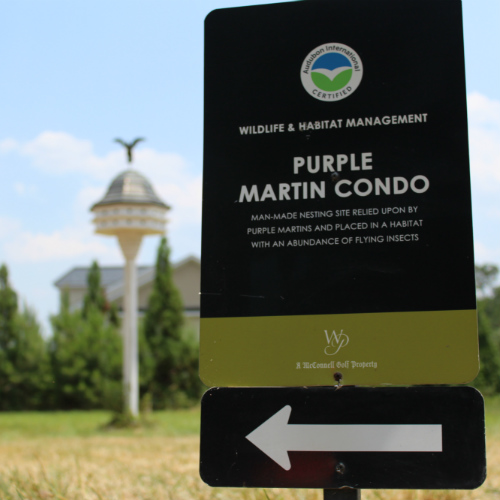
Agronomy teams blend peak course conditions with sustainable practices
Governing nearly 2,000 acres of greenspace across three states, McConnell Golf takes its impact on the environment seriously. While striking the perfect balance between pure course conditions for golfers and sustainable environmental practices for the planet takes years of effort, agronomy teams have dutifully accepted the challenge. Let’s catch up on their latest efforts.
High Standards
As far as eco-friendly golf courses go, the Audubon Cooperative Sanctuary Program (ACSP) is the Holy Grail.
The award-winning environmental education and certification program helps courses protect the environment and preserve the natural heritage of the game. The program aims to enhance valuable natural areas and wildlife habitats surrounding golf courses in order to improve efficiency and minimize potentially harmful practices.
Achieving Audubon certification can also gain golf courses and clubs recognition for their efforts toward saving the planet. Membership in the ACSP has grown steadily since the program began in 1991 - bolstered by collaborative efforts with the United States Golf Association (USGA) – and now includes more than 2,300 golf courses in the United States and three dozen countries worldwide.
The ACSP assists each participating golf course in taking stock of its environmental resources and any potential liabilities, then develops a plan that fits the course’s unique setting, goals, staff, budget and time. The path to certification encompasses six key components:
• Environmental planning
• Wildlife and habitat management
• Chemical use reduction and safety
• Water conservation
• Water quality management
• Outreach and education
McConnell Golf Director of Agronomy Michael Shoun says achieving Audubon certification is an involved process that demonstrates an organization’s leadership, commitment and high standards of environmental management. Once a course’s unique plan is implemented and the results carefully documented, Audubon International staff visit the property to ensure compliance. Recertification is required every three years to maintain the Certified Sanctuary designation.
Among the McConnell Golf stable of golf courses, The Country Club at Wakefield Plantation is Audubon certified, while Sedgefield Country Club and The Reserve Golf Club are several years into the process, and Old North State Club on Badin Lake has taken steps to renew its certification.
Power To The Pollinators
Scientists have known for decades that North America’s monarch butterfly population is in trouble. Habitat loss, weather changes and pesticides have all at one time or another been listed as the primary cause, but the truth is not so simple. There is no easy or single answer and what can be done to stop the monarchs’ decline remains unclear.
Last year, The Country Club at Wakefield Plantation started the “Monarchs in the Rough” program in which a variety of plants are allowed to grow in the golf course’s natural areas as habitat for butterflies.
"It’s a program that the Golf Course Superintendents Association of America (GCSAA) has requested people try so we can increase areas for butterflies to nest and reproduce,” Shoun said. “They’re hoping this will help [the decline] and that if we allow these specific plants to grow in those areas, we’ll see populations start to increase again."
Like the monarch butterflies, there has also been a crisis sweeping the world’s honeybee population. Not only are there fears that there might be a global shortage of honey, but also grave concern about the critical role honeybees play in pollinating much of the food we eat today. The American Beekeeping Federation estimates close to one-third of all the food Americans eat is directly or indirectly derived from honey bee pollination.
To address the problem, CC Wakefield Plantation Superintendent Todd Lawrence introduced beehives three years ago. He initially purchased two, then later captured and relocated a third.
“With everything you hear about how quickly bees are dying off, we wanted to help increase the population – and also look at producing some honey,” he said.
As she often does, Mother Nature has thrown a few curve balls. While last year Lawrence was able to fill his first jar of honey, the weakest hive perished that fall and the remaining two were lost over the winter.
“It’s all part of the learning process,” Lawrence says, “There are many variables at play that impact the health of the bees.
The effort certainly isn’t being abandoned as losing the hives has only underscored their delicate nature and how susceptible they are to environmental changes. Later this year, Lawrence hopes to reinstate the bees.
Worldwide, the pollinating efforts of bats, birds, bees and insects such as monarchs is worth an estimated $100 billion per year in crop yields according to the International Union for Conservation of Nature. However impactful the efforts of McConnell Golf are to aide local ecosystems and bolster the beauty and enjoyment of its courses, it is but one small part in the overall health of the planet. Perhaps the lesson learned here, in helping to re-establish pollinators, is that every little bit counts.
